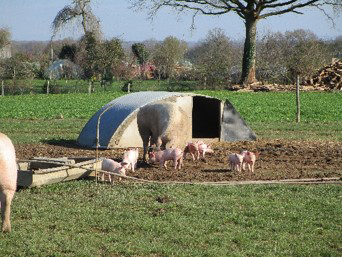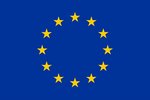Do piglets in organic farms need iron supplementation?
This study within the CORE Organic Cofund project POWER, aimed at describing the practices in French organic pig farms regarding iron supplementation of piglets at birth and determine the iron status of the piglets at weaning. It shows that iron supplementation is necessary indoors but not outdoors.

The newborn pig has very little iron storage, but important iron needs to sustain its rapid growth. The milk of the sow is poor in iron, and before weaning, most of the piglets eat too few solid cereal-based feed to satisfy their biological needs in iron. To avoid any risk of deficiency, in conventional pig farming, piglets are supplemented with a high dose of iron administered during the first days of life, most of the time in the form of an intra-muscular injection. In organic farming, the use of medication must be limited to its minimum, and there is a debate whether iron injection should be considered or not as an allopathic treatment.
This study was carried out in the spring of 2019. It described the practices of French organic farmers regarding iron supplementation, and investigated the iron status of their piglets. Among the 11 outdoor and 9 indoor organic farms that were investigated, iron injection was used in most of indoor farms (200 mg: 8 farms, 100 mg: 1 farm, no supplementation: 1 farm), while in outdoor systems, mostly no supplementation was performed (200 mg: 1 farm, no supplementation: 10 farms).
In each farm, approximately 30 piglets (half males and half females) born from different mothers were blood sampled just before weaning. In comparison with the indoor - iron injected piglets, the outdoor - non-supplemented piglets had a greater blood haemoglobin concentration (118 vs. 105 ± 2 g/L, P < 0.001) and a bigger red blood cell volume (60 vs. 56 ± 1 fl, P < 0.01), indicating a better iron status. In the only indoor farm that did not used iron supplementation, these two variables were low (81 ± 3 g/L and 48 ± 1 fl, respectively), suggesting an iron deficiency. By comparing piglets from primiparous and multiparous sows, we also observed that the iron status of piglets born from primiparous sows was lower than for those born from multiparous mothers (109 vs. 114 ± g/L of haemoglobin, P < 0.001).
Three main conclusions can be drawn from this study. First, most indoors and outdoors farmers have chosen the right option regarding iron supplementation. Second, outdoor piglets find a sufficient amount of iron in their natural environment, probably by foraging and ingesting soil. Third, an iron supplementation is necessary indoors to avoid anaemia.
The comparison with outdoor pigs showed that a single intramuscular injection might be suboptimal. This observation is in agreement with previously published studies, that recommended several injections during the lactation period (Heidbüchel et al, 2019), a strategy which is not appropriate for organic farming. Thus, there is a need for finding alternative solutions to iron injection for newborn piglets.
This study is part of the CORE Organic Cofund project POWER: http://projects.au.dk/coreorganiccofund/research-projects/power/
Authors info
Elodie MERLOT. PEGASE, INRA, AGROCAMPUS OUEST, 35590, Saint Gilles, France. Elodie.merlot@inra.fr , https://www6.rennes.inra.fr/pegase_eng/
Armelle PRUNIER. PEGASE, INRA, AGROCAMPUS OUEST, 35590, Saint Gilles, France. https://www6.rennes.inra.fr/pegase_eng/
Maud PAUWELS. BioEpAR, INRA, ONIRIS, 44307 Nantes, France. https://www6.angers-nantes.inra.fr/bioepar_eng/
Catherine BELLOC. BioEpAR, INRA, ONIRIS, 44307 Nantes, France. https://www6.angers-nantes.inra.fr/bioepar_eng/
